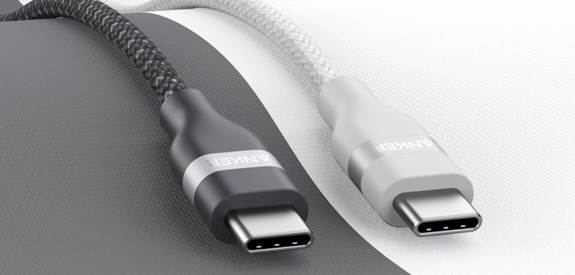Selecting the right usb c cable is more than just
finding one that fits your device. The speed and reliability of a USB-C cable
can significantly impact your device performance, from faster charging to
efficient data transfer. With numerous options available, determining the best
USB-C cable can be daunting. Let’s dive into the key factors that make a USB-C
cable both fast and reliable, ensuring you get the most out of your tech
investments.

Understanding USB-C Cable
Specifications
Power
Delivery (PD) Ratings
Power Delivery ratings are crucial
for determining how quickly a USB-C cable can charge your device. Higher PD
ratings usually mean faster charging as the cable can handle higher power
levels. For example, a 100W PD cable will charge a laptop much faster than a
30W PD cable. Always check your device’s recommended PD rating to ensure
compatibility.
Data
Transfer Speeds
Data transfer speed is another essential
specification. USB-C cables can support different standards such as USB 3.2 or
Thunderbolt 4. A higher standard often means faster data transfer rates. For
instance, USB 3.2 can handle up to 20 Gbps, while Thunderbolt 4 can support up
to 40 Gbps. Understanding these speeds can save you time, especially in
data-intensive activities.
USB-IF
Certification
USB Implementers Forum (USB-IF) certification is a
hallmark of quality and reliability. A USB-IF certified cable meets industry
standards for performance and safety. Cables without this certification may not
provide the same speed or reliability, and could potentially damage your
devices. Always look for the USB-IF logo when purchasing a USB-C cable.
Factors Affecting Cable Durability
Cable Length and Signal Degradation
Longer
cables can be convenient for extended reach, especially in larger spaces or
when outlets are far away. However, increased length can lead to higher
resistance, which may reduce charging efficiency and slow data transfer speeds.
To avoid performance drops, choose a cable length that matches your setup
without exceeding what’s necessary. This ensures both convenience and optimal
functionality.
Build
Quality and Materials
The
longevity of a USB-C cable largely depends on its build quality and materials.
Cables with braided exteriors, reinforced connectors, and high-quality
insulation are generally more durable. Standard rubber-coated cables can wear
out quickly, especially at connection points. Investing in well-built cables
can save you money in the long run.
Connector
Design and Durability
Connectors
are susceptible to wear and tear due to frequent plugging, unplugging, and
physical stress, making their design critically important. High-quality
connectors often include features like strain relief and reinforced joints,
which help prevent damage from bending or twisting. Additionally, gold-plated
connectors are preferred for their superior resistance to corrosion, ensuring a
longer lifespan and a more stable, reliable electrical connection over time.
Choosing the Right USB-C Cable for
Your Needs
Matching Cable Specifications to
Device Requirements
Matching the right cable
specification to your device’s requirements is critical. Charging a laptop will
need a cable with high PD ratings, while transferring large files will require
a cable with high data transfer speeds. Always read your device’s manual or
specs to choose the correct cable for optimal performance.
Evaluating Brand Reputation and Reviews
Brand reputation and customer
reviews play a crucial role when selecting a USB-C cable. Trusted brands such
as Anker have established themselves by consistently offering reliable and
high-quality products. Reading user reviews allows you to gain insights into
real-world performance, durability, and potential issues, helping you make a
smarter, more informed purchase decision tailored to your needs.
Price vs. Performance Considerations
Price is an important
consideration, but it shouldn’t be your only guide. Cheaper USB-C cables may
seem like a bargain, but they often lack essential safety features, build
quality, or certification for high-power charging. Investing in a well-made,
slightly more expensive cable—like those from trusted brands—can offer better
performance, greater durability, and long-term value, ultimately saving you
money and hassle.

Top
USB-C Cable Recommendations
Anker
USB-C cables are among the top recommendations for their exceptional quality,
safety, and performance. Built with premium materials and reinforced connectors,
they’re designed to withstand daily wear and tear while maintaining consistent
functionality. Whether you're charging a smartphone, transferring large files,
or powering a laptop, Anker offers a wide range of cable options to suit your
needs. With strong user reviews and compliance with key charging standards,
Anker cables are a trustworthy choice for virtually any device.
Conclusion
Choosing
a fast and reliable USB-C cable involves understanding specifications,
assessing durability, and matching your device’s needs. By focusing on features
like PD ratings, data transfer speeds, and USB-IF certification, you can ensure
optimal performance. Remember to consider build quality, connector design,
brand reputation, and user reviews. Investing time in selecting the right USB-C
cable will enhance your device experience, making your daily tech interactions
smoother and more efficient.
